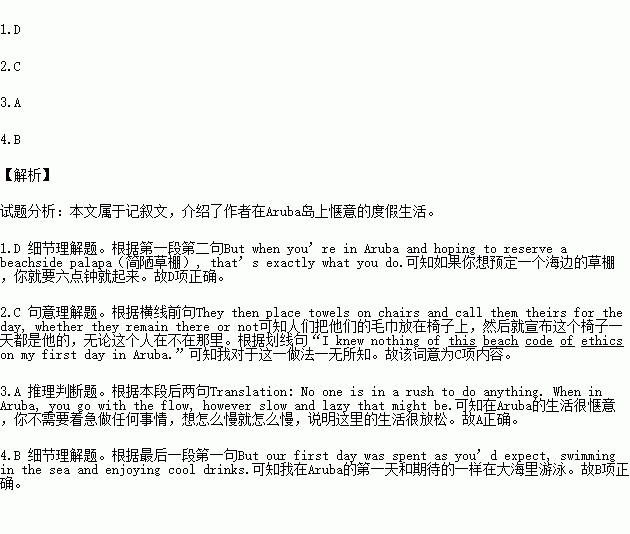题目内容
I was on vacation, and in my mind, vacation does not mean setting my hotel room alarm clock for 6 am. But when you’re in Aruba and hoping to reserve a beachside palapa(简陋草棚), that’s exactly what you do.
Tourists begin lining up at the crack of dawn to secure these umbrella-like wood structures that are covered with dried and woven palm leaves. They then place towels on chairs and call them theirs for the day, whether they remain there or not. I knew nothing of this beach code of ethics on my first day in Aruba. I saw an empty chair covered with a towel and took it. It was a big mistake.
For many visitors, a week bathing in the sun is the only activity they wish to pursue. It sounded good to my girlfriend, Barbara, and me after Boston’s awful winter. Six more inches of snow was predicted on the day we left. The sun, the sand, and the beach seemed just about right.
Aruba’s slogan is “One Happy Island”, and it doesn’t take long to understand why. Aruba is said to be on “island time”. Translation: No one is in a rush to do anything. When in Aruba, you go with the flow, however slow and lazy that might be.
Cooling trade winds, white sandy beaches, turquoise(蓝绿色)waters, and dazzling sunsets are all good reasons to visit. But this 20-mile island offers more than lazy days walking on the beach. There is amazing night life, casinos, golf, scuba diving(水肺潜水), fine dining, shopping, and a great national park.
But our first day was spent as you’d expect, swimming in the sea and enjoying cool drinks. Our drink of choice quickly became the Coco Loco. It’s as refreshing as it sounds.
1.Tourists get up at 6 am because they _____.
A. want to see the sunrise early
B. need to check out early
C. want to have fun longer
D. need to reserve a beachside palapa
2.What does the underlined part in Paragraph 2 refer to ?
A. Using whatever chair you like.
B. Waiting in a long line for a palapa.
C. Taking up a chair by placing a towel on it.
D. Covering a palapa with woven palm leaves.
3.Paragraph 4 shows life in Aruba is very _____.
A. relaxing B. expensive
C. frightening D. disappointing
4.What did the author do on his first day there ?
A. He went shopping.
B. He swam in the sea.
C. He went scuba diving.
D. He visited a national park.
 名校课堂系列答案
名校课堂系列答案
